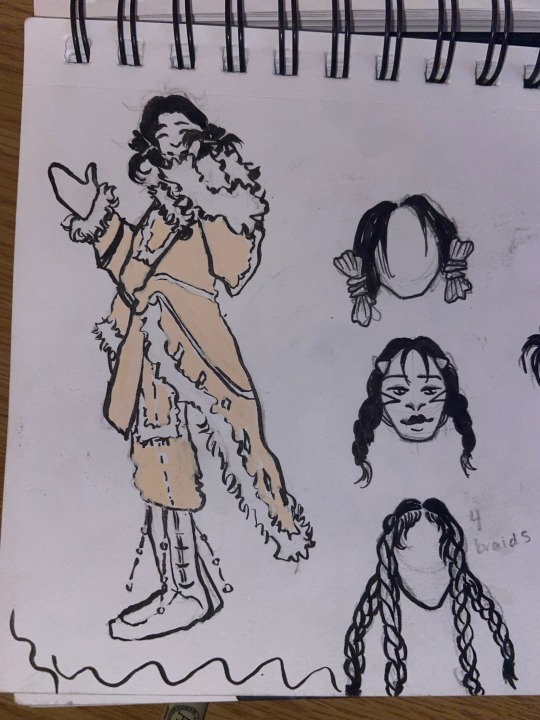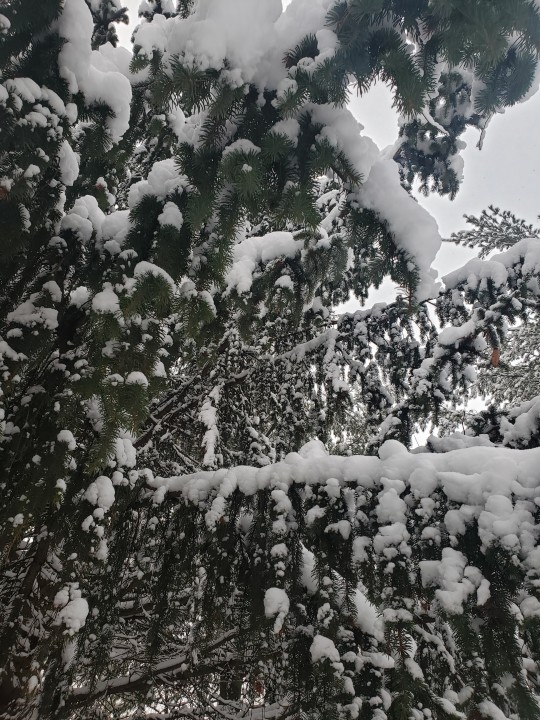#ojibwemowin
Text
“I struggled through school, being spoon-fed out of a bucket of whiteness every day,” he reflects.
“I found ambition, pursued a formal education after high school and beyond but I knew I was just buying time and building credentials. I was subversive, contrarian, driven, and ready to do something big and bold. I wanted to turn the whole education system of torture on its head. I just needed to find a way.”
51 notes
·
View notes
Text
Fun fact: in Anishinaabemowin, the term for a cat purring is "nagamo gaazhagehns" / "nagamo biizhehns" / " nagamo boozhehns" (different dialects have varying words/spellings for a house cat)
But the main thing is that "nagamo" is the verb for "he/she/that one sings"
Cat purring in Anishinaabemowin is essentially called "cat singing"
#anishinaabemowin#ojibwemowin#ojibwe#anishinaabe#indigenous languages#the words for cat also are fun#gaazhagehns comes from the verb 'gaazhage' which means 'he/she/that one eats greedily or is gluttonous#so gaazhagehns translates roughly to 'little greedy eating one'#and boozhehns/biizhehns are the diminutive versions of the the word for a lynx (bizhiw) because#--that was the example of a feline that existed in our language/world when domestic cats were introduced to us#so we just called them 'tiny/baby lynxes'#i love anishinaabemowins maliability and ability to just create words to address new things#nish tag#linguistics#original posts#indigenous tag
226 notes
·
View notes
Text

Biitooshin asin. - “The rock lays in layers.”
Biitooshin vai. it (animate) lays in layers
Asin na. rock
10 notes
·
View notes
Text
how tf do you pronounce nbazgim
7 notes
·
View notes
Text



mii ongow ojibwe anishinaabeg gaa-mazinibii'agwaa
collection of some indigenous people in my sketchbook
#ojibwe#anishinaabemowin#ojibwemowin#anishinaaabe#anishinaabe#art#character design#fictional characters
12 notes
·
View notes
Text
Ojibwemodaa! Let’s speak Ojibwe!
Gidaa-giziibiigininjiin- you should wash your hands
Wiisinidaa- let’s eat!
Geyaabi wiisinin! Keep eating!
Gimino-pidaan ina? Do you like the taste of it?
Aaniin ezhinikaazoyin? What are you called/what’s your name?
Cedar indizhinikaaz- I’m called Cedar
How old are you? Aaniin endaso-biboonigiziyan?
I’m 34 years old. Nisimidana shi niiwin nimbiboonigiz.
Ambegish minwendaman ji-ani-gimendaman owe! I hope you enjoyed learning this!
#ojibwe#ojibwemowin#anishinaabe#anishinaabemowin#immersion#immersion teaching#kindergarten#k 12 education#early childhood education#culture#language#ojibwe language#elementary education
1 note
·
View note
Text
Even though ojibwe is my first language I ended up forgetting most of it due to my surroundings. Would anyone be able to recomnend/link resources that may help me with relearning the language?
1 note
·
View note
Text
sorry not sorry i will forever be using ojibwemowin in my little blurbs on here
#not that anyone asked#but i felt it should be known#also gizaagiin means i love u. it’s my favorite word in ojibwemowin and one of the first ones i was taught
0 notes
Text
Remember how small you were, both of us little birds? Banajaanh; fresh from the nest, winter still staining your cheeks
Chirping that bright laugh, honey sticky hands clapping. We ate sweetbread, black rice and maize
It's foreign on my tongue, now.
#poetry#spilled ink#original poetry#im learning ojibwemowin again#kinda nice to feel connected to a granny again#this one was originally written for a prompt but heck is it late
1 note
·
View note
Text
The app/site I use for learning Japanese, Transparent Language, has an Ojibwe section created with 7000 Languages and Grassroots Indigenous Multimedia. It has a whole complex reference book for grammar and pronunciation and GOD I am excited to find an Ojibwemowin resource that isn't just youtube videos.
#reviews tell me that the cost of a transparent language subscription isn't really worth it#but i get it free through my library so i wouldn't personally know tbh
442 notes
·
View notes
Text
Goonikaa zhingobiing!
The spruce is full of snow!

Language breakdown for fellow Anishinaabemowin learners below the cut!
•"Goon" - noun for snow
>>"-po" is a morpheme also used for snow in many words, especially weather verbs that discuss the act/process of snowing. Words using "goo-"/"go-" tend to talk about already fallen snow.
>>Ex. "Ishpaagonagaa" - (v.) The snow is deep/it is deep snow, vs. "Gibichipon" - (v.) The snowing stops/lets up
•"-kaa" - verb suffix meaning "to be a lot of ___" or "it is very ___"
>>Ex. Anang = (n.) star -> anangokaa = (v.) It is very starry out/there are lots of stars. Here it is used to mean “it is very snowy/there is a lot of snow.”
•"Zhingob" - the word I learned for spruce trees (non-species specific)
>>Although there are more specific words for various spruce species. And also some people use different words! From a quick look, people also use "mina'ig," "gwaawaandag," & "wadab" for various spruces. And I know some people use "zhingob" to mean balsam firs! >>Anishinaabemowin is a geographically widespread language with lots of regional and dialect differences and they are all correct!)
•"-ing" (or "-ong," "-ang") - suffix that indicates a location. This could mean at, in, on, around whatever word its attached to. (Used in basically all “proper noun” place names.)
>>In this instance, spruce + location-indicator = in/around the spruce.
>>Ex. "Waakaa'igan" (n.) = house -> "waakaa'iganing" (adj.) = in the house/at the house
#ojibwemowin#anishinaabemowin#let's learn together!#nanda-gikendandaa maamawii#anishinaabe#nish tag#linguistics#original posts#indigenous tag
9 notes
·
View notes
Text
Geget sa naa niminwendaan epiichi-gimiwang gabe-dawateg, wii-nitaawiginoon iniw gitigaanan.
#I really love all the rain we got last week#the plants are gonna grow all nice#anishinaabe#anishinaabemowin#ojibwe#ojibwemowin#rain#flower#tiger lily#cinemetography#shot on iphone#plant#green#garden#flowers#raindrops
10 notes
·
View notes
Text
WAYIIBA INGA-DIBA'AMAAGOO JI-OJIBWEMOYAAN ENDASO GIIZHIG AHHHHHHHHHHHHHHH

#oshki anokiiwin woohoo#AHHHHHHHHHHHHHHHHHHHHHHHHHHHHHHHHHHHHHHHHHHHHHHHHHHHHHHHHHHHHHHHHHHHHHHHHHHHHHHHHHHHHHHHHHHHHHHH#ojibwemowin#ojibwe#anishinaabemowin#anishinaaabe
10 notes
·
View notes
Text

#ojibwe#Ojibwemowin#anishinaabe#anishinaabemowin#Ojibwe language#immersion#learning#teaching#kindergarten#elementary education#word list
1 note
·
View note
Text

MAY 20th 21st ANNULAR SOLAR ECLIPSE NEW MOON IN GEMINI
NZ 11.47am 21st AUST EST 9.47am 21st GMT 11.47pm MAY 20th
ECLIPSE TIME NZ 11.53am 21st AUST EST 9.53am 21st GMT/UTC 11.53pm MAY 20th
* * * *
“When you hear Chopin,” Father Damien asserted, “you find yourself traveling into your childhood, then past that, into a time before you were born, when you were nothing, when the only truths you knew were sounds.” “Ayiih! Tell me, does this Chopin know love songs? I have a few I don’t sing unless I mean for sure to capture my woman.” “This Chopin makes songs so beautiful your knees shake. Dogs cry. The trees moan. Your thoughts fly up nowhere. You can’t think. You become flooded in the heart.” “Powerful. Powerful. This Chopin,” asked Nanapush, “does he have a drum?” “No,” said Damien, “he uses a piano.” “That great box in your church,” said Nanapush. “How is this thing made?” Father Damien opened his mouth to say it was constructed of wood, precious woods, but in his mind there formed the image of Agnes’s Caramacchione settled in the bed of the river, unmoved by the rush of water over its keys, and instead he said, “Time.” As soon as he said it, he knew that it was true. “Time. Chopin’s piano was made of time. What is time in Ojibwemowin?” asked Damien.
“We see the seasons pass, the moons fatten and go dark, infants grow to old men, but this is not time. We see the water strike against the shore and with each wave we say a moment has passed, but this is not time. Inside, we feel our strength go from a baby’s weakness to a youth’s strength to a man’s endurance to the weakness of a baby again, but this is not time, either, nor are your whiteman’s clocks and bells, nor the sun rising and the sun going down. These things are not time.” “What is it then?” said Father Damien. “I want to know, myself.” “Time is a fish,” said Nanapush slowly, “and all of us are living on the rib of its fin.” Damien stared at him in quizzical fascination and asked what type of fish. “A moving fish that never stops. Sometimes in swimming through the weeds one or another of us will be shaken off time’s fin.” “Into the water?” asked Damien. “No,” said Nanapush, “into something else called not time.”
The Last Report on the Miracles at Little No Horse
by Louise Erdrich
[alive on all channels]
#eclipse#from space#quotes#The Last Report on the Miracles at Little No Horse#Louise Erdrich#alive on all channels#reading and writing#words and writing#my favorites
2 notes
·
View notes